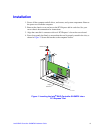
1 Intel® RAID Controller SASMF8I Hardware Guide
1Overview
This chapter provides a general overview of the Intel
®
RAID Controller SASMF8I. It
consists of the following sections:
• Summary of SAS RAID Controller Features
• Benefits of Serial Attached SCSI (SAS)
The Intel
®
RAID Controller SASMF8I Storage Adapter is a high-performance PCI
Express* SAS RAID controller and software RAID solution. It provides reliability, high
performance, and fault-tolerant disk subsystem management. This is an ideal RAID
solution for the internal storage needs of mid to low-end servers and workstations for use
by workgroups and departmental sized organizations or individuals. The RAID Controller
SASMF8I offers a cost-effective way to implement RAID in a server for internal storage.
The SAS controller allows you to use SATA II and SAS hard disk drives in the same
system, so you can take advantage of the benefits of each type of drive. The controller
supports up to eight devices including expander devices. See the ANSI SAS standard,
version 1.0 specification for more information about the use of expanders.
As the second generation PCI Express storage adapter, the RAID Controller SASMF8I
addresses the growing demand for increased data throughput and scalability requirements
across mid to low-end servers and workstations. Simplified cabling between drives is an
additional benefit.
Summary of SAS RAID Controller Features
Note: In this document, the term low-profile refers to the height, not the length, of a PCI add-in
card.
The Intel
®
RAID Controller SASMF8I is a low-profile SAS RAID adapter with:
• An LSI 1068E SAS (including SATA) controller.
• Eight independent internal ports provided via two SFF8087 connectors.
• Support for both enterprise-class SAS devices and enterprise-class SATA II drives.
• Support for up to 8 SAS or SATA II drives and 40 logical drives.
• PCI Express* connector that fits into a x4 PCI Express slot capable of 2.5 Gbps per
lane over PCI Express x1, or x4.
• 3.0 Gbps point-to-point transfer rate.
• Both a standard and a low-profile bracket.


















